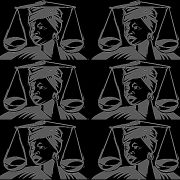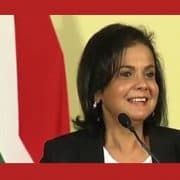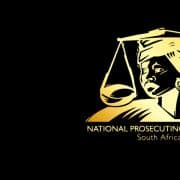|
Getting your Trinity Audio player ready...
|
Recently appointed national director of public prosecutions (NDPP) Shamila Batohi, who starts her 10-year tenure today with a view to turning the tide of corruption and incompetence in the National Prosecuting Authority (NPA), has built a successful legal career while maintaining a relatively low profile. She was appointed at the beginning of December 2018 by President Cyril Ramaphosa, but because of her contractual obligations as a senior legal advisor at the International Criminal Court (ICC) in The Hague, could not start immediately.
Corruption Watch wishes her all the best in her challenging task.
Originally from the Durban area, Batohi brings some 30 years of experience to her new job. She completed her legal studies at the former University of Durban Westville and went on to obtain a postgraduate degree at the old University of Natal. After a stint in private practice, Batohi joined the KwaZulu-Natal National Prosecutions Service and stayed there for 15 years, serving over seven of those years as director of public prosecutions.
She was on the prosecuting team during the King Commission of Inquiry into Cricket Match Fixing in 2000, after which former South African captain Hansie Cronje was banned for life from cricket. She joined the ICC in 2009 for an initial one-year stint, which became a decade.
Batohi is the first woman to be appointed permanently as NDPP. Her priority is likely to be the establishment of stability and integrity at the organisation, which has been plagued by stymied investigations, corruptible advocates, and a rapid turnaround in leadership over the years. Since 1994, no NDPP has served out their full term.
Two sitting inquiries, the Zondo Commission into state capture and the Mokgoro Inquiry into the fitness of advocates Lawrence Mrwebi and Nomgcobo Jiba to hold office, have heard in the past two weeks how senior NPA officials – including the two afore-mentioned advocates as well as former NDPP Menzi SImelane – willingly took bribes in order to prevent investigation and prosecution into the dodgy dealings of services supply company Bosasa.
Jiba and Mrwebi were paid to leak any and all information related to the case, so that Bosasa could know its progress at any given time.
Support from a country in search of justice and fairness
Batohi has received strong support from South Africans from all walks of life. Journalist Mandy Wiener (@MandyWiener) tweeted: “Dear Adv Shamila Batohi. You start your job today as head of the @NPA_Prosecutes. We have great faith and hope that you will restore credibility. Please don’t let us down. We need action. The country needs justice. Put people behind bars. Bring integrity back to VGM. Good luck.”
Former Corruption Watch board member Mary Metcalfe (@metcalfemary11) tweeted: “Strength to her arm Shamila Batohi, the woman with the country on her shoulders.” Without the Zondo and and Makgoro commissions and the Gupta leaks, Metcalfe added, “her starting would be much more difficult!”
Former public protector Thuli Madonsela (@ThuliMadonsela3) chipped in with “Congratulations Adv Shamila Batohi on :assuming office as National Director Public Prosecutions (NDPP). May your leadership be fruitful and help reboot our nearly derailed democracy. Blessings.”
Mbuti Motlomelo (@Mbuti_Motlomelo) tweeted: “Well wishes to Advocate Shamila Batohi on her 1st day at work.”
“She is coming into an institution that is utterly dysfunctional and riven by division; (its leaders) have done the bidding of those in power,” said Adv Howard Varney, speaking to Daily Maverick. “The network of corruption required that the key decision-makers in the NPA be controlled. There are individuals (working there) who have overseen the effective destruction of the institution.” Varney worked with Batohi in the Investigation Task Unit, mandated by the late Nelson Mandela to look into violence in KwaZulu-Natal during the 1990s.
Advisory panel and transparent appointment process
Batohi was chosen, after careful consideration, from a final list of five. The other four candidates were:
- Adv Siyabulela Mapoma
- Adv Simphiwe Mlotshwa
- Adv Rodney de Kock
- Adv Andrea Johnson
The five were selected from 11 candidates who were interviewed – in the presence of media – at the Union Buildings in Pretoria from Wednesday 14 November 2018 to Friday 16 November.
In August 2018 the Constitutional Court confirmed the invalidity of former NDPP Shaun Abrahams. Corruption Watch, Freedom Under Law and later, the Council for Advancement of the South African Constitution, had challenged – successfully – the legality of the termination of Abrahams’ predecessor Mxolisi Nxasana’s appointment and afterwards, a golden handshake of R17.3-million, in the High Court.
In December 2017 the Pretoria High Court handed down judgment that the settlement agreement that led to Nxasana’s removal was indeed unlawful and that the termination of Nxasana’s appointment was invalid and set aside. Furthermore, it confirmed that the subsequent appointment by former president Jacob Zuma of Adv Shaun Abrahams as head of the National Prosecuting Authority (NPA) was also invalid and therefore set aside. In February 2018, Abrahams and the NPA appealed to the Constitutional Court against the order invalidating Abrahams’ appointment
But in the ConCourt on 13 August last year, Justice Mbuyiseli Madlanga held that the manner in which Nxasana vacated office was not consistent with the Constitution. In that case, Madlanga said, it follows that the subsequent appointment of Shaun Abrahams was also constitutionally invalid.
In October 2018 Ramaphosa invited a number of legal organisations and independent public institutions to help him identify and select individuals for consideration as possible candidates for the position of NDPP. This invitation formed part of his effort to meet the deadline set by the Constitutional Court to appoint a new NDPP within 90 court days of 13 August.
The organisations and institutions invited to assist the president in this endeavour nominated senior legal practitioners to serve on the panel headed by energy minister Jeff Radebe.
The panel comprised:
- Mr Thembekile Kim Makwethu (Auditor-General of South Africa);
- Advocate Bongani Majola (South African Human Rights Commission);
- Adv Jaap Cilliers (General Council of the Bar of South Africa);
- Mr Richard Scott (Law Society of South Africa);
- Mr Lutendo Sigogo (Black Lawyers Association);
- Mr Lawrence Manye (Advocates for Transformation), and
- Mr Mvuzi Nyotesi (National Association of Democratic Lawyers).







